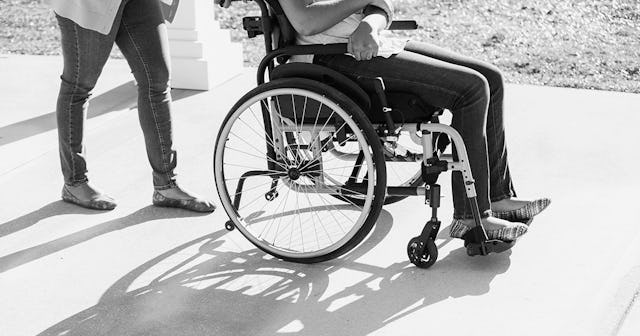When My Preteen Daughter Started Using A Wheelchair, People Began To Treat Her Differently

When I was pregnant, I remember being appalled by the audacity of people who would freely comment on my growing belly. “You’re so big,” they’d coo. Or they’d just reach out and pet me, as if I were an animal. And I’d squirm, uncomfortably. Because normalized or not, it’s wildly inappropriate and awkward. Then once my daughter was born I remember being even more appalled that strangers would try and tell me how to parent her. “Put that baby down” they’d say, as they saw her on my chest in a wrap. Or, “she’s too big for that,” as she nursed at a year. And worst of all, people would touch her, without first asking me. But, as she grew up, the unsolicited advice tapered and fewer and fewer hands reached for her. And it was a relief. We’d reached the point where our autonomy was respected and our space was ours.
Then, a seizure took my daughter’s mobility. Resulting in her becoming dependent upon her wheelchair. And like that, we traveled back 10 years.
Again, people feel entitled to comment freely.
kali9/Getty
They ask her “why she needs a wheelchair when she’s so young?” They tell us about the oils and juice products they sell, as if they’re a “miracle cure.” They tell her “if she just tried harder…” completely unaware of the hours of therapy each day for her holds. And it makes me crazy. Because THEY DON’T KNOW. And it’s not their place to. She shouldn’t have to justify the space she takes up – yet, every day she’s asked to. She shouldn’t have to listen to sales pitches or hear she’s not doing enough, just because she relies on adaptive equipment. And she should never publicly be asked her private medical history to appease the curiosity of someone who has no “need to know.”
Yet, her wheelchair invites all these uncomfortable conversations and so many more.
Her wheelchair, for reasons I will never understand, takes us back to a place most people “outgrow” by their second birthday.
And it’s not just words.
monkeybusinessimages/Getty
People approach her with “kid gloves” on. Without asking, they move her chair, assuming she can’t, pat her on the head and patronizingly call her “sweetie.” They suddenly cut up her food at restaurants, bend down to talk to her — or worse yet, look past her and talk to me. Which, of course, makes no sense. There’s ZERO connection between her legs and the deficits they perceive. And it drives us both bonkers.
But whereas I get frustrated, she responds with grace. She explains that she can use her hands, usually even proudly exclaiming she “graduated occupational therapy. She’ll tell you her ears work fine, and she’ll say “I’m sick, not broken.” If you ask her “why she’s out and about” or “how she got somewhere,” with a smile she’ll ask the same of you.
And I am SO proud of her resilience, but heartbroken, too. Because it shouldn’t have to be this way.
My Gracie is a strong, independent and fierce girl. She’s a horseback rider, a science enthusiast and an outspoken community activist. She’s a strong student and a wizard in the kitchen. She loves fast cars, painting nails, and hanging out with her friends. She’s quick with a joke and in times of tension, always the first to forgive. These aren’t things that make her brave or extraordinary, as people who see her in her wheelchair often will exclaim, they are simply the traits that make her, her.
frankiefotografie/Getty
She lets nothing stand in the way of her best life, though everyone expects her to. And it’s hard. Because while she’s out there “living,” she’s also having to prove her worth. And I want to jump up and down and scream on her behalf, because it’s not fair.
But, while I am stomping my feet and having a tantrum, she’s moved on. Because she knows her abilities and worth and isn’t worried about those looking on.
She does what she can – and asks for help where it’s needed.
She doesn’t get mad when people assume she can’t — she takes the time to tell them why she can. Her patience is greater than mine and for that I am proud.
But I ask of everyone reading — for her, and for others in wheelchairs — please recognize wheelchairs are tools for mobility, not universal limitations of the human experience.
This article was originally published on